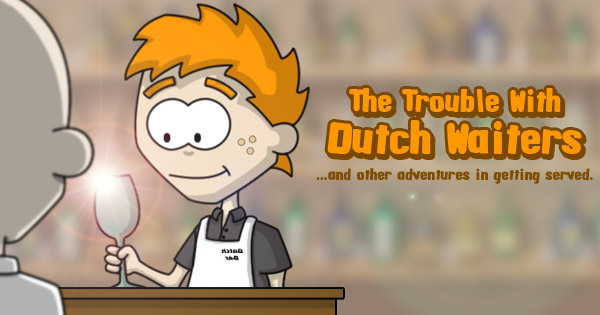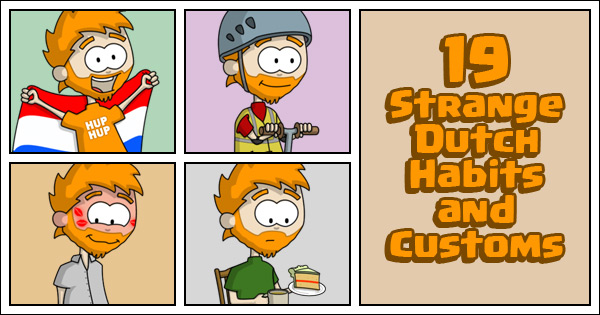The Trouble With Dutch Waiters

The first mistake anyone can make when entering a Dutch bar, café or restaurant and trying to get the Dutch waiter’s attention is: entering a Dutch bar, café or restaurant and trying to get the Dutch waiter’s attention. Dutch waiters simply don’t like their attention being got. It is a fact of nature.
Trying to Get the Attention of a Dutch Waiter
Trying to get the attention of a Dutch waiter, waitress or any other member of bar staff is a battle of wills which can rarely be won. You might eventually get served but this only occurs when the Dutch waiter has decided to acknowledge your attempts to do so (which they will still do begrudgingly).
For example: whenever you enter a café in Holland it is inevitable that the waiter behind the bar is cleaning a glass. It is also inevitable that they will suddenly develop extreme tunnel vision and your approach to the bar will go unnoticed. In addition to this, they will become extremely dedicated to the cleanliness and hygiene of that one single glass (in a way that suggests an extreme case of obsessive compulsive disorder). They will clean it over and over again and seemingly fail to notice you waiting for them to put it down. It should be noted that a blind and deaf man has more awareness of his surroundings than a Dutch waiter who wants to avoid dealing with customers.
This glass cleaning technique will continue well past the point of un-comfortableness and force you to question your own existence as all of your coughing, arm waiving and flare firing continue to go unnoticed during their Gollum-like fascination with the very clean glass.
However, if you have the strength to wait long enough even a Dutch waiter will eventually have to admit to themselves that the glass is clean enough, put it down and (if they don’t pick up another) let their attention be got.
The Dutch Language Test
There is one very important thing that must be remembered once you have the attention of a Dutch waiter: do not attempt to order in Dutch if you are not Dutch. Seriously, don’t do it. Speaking to the Dutch in their own language rarely works at the best of times. They can instantly recognize a non-Dutch accent. Normally this might just mean they would reply in English… But not in the case of the Dutch waiter.
The waiter is already unhappy that they had to give you their attention. If you attempt to order in Dutch you will become their play-thing as they pick your Dutch speaking ability to pieces and refuse to fulfill your order until you can pronounce it better than Queen Beatrix herself. You will not be allowed to switch back to English either. They will force you to finish what you started in the interest of, “learning the language.”
In fact, Dutch waiters are so strict when it comes to the use of their own language that if they were used as part of the Inburgeringstoets process (Dutch Immigration and citizenship test) most applicants would probably end up being barred from the country. That or give up after being ignored for so long and move to Belgium.
You better enjoy that beer once you have it because it will be a long time until you get another. Dutch waiters really don’t like their attention to be got.
Dutch waiters are just one example of how Dutch customer service is sometimes questionable.












if you say,”meneer/mevrouw mag ik bestellen?” then you can get their attention. I’ve tried it a couple of times and it worked. Ordering part is still challenging though.
Dutch waiters are ten times better than French waiters – and I have found Dutch bars much friendlier than French. I think the thing is what English speakers call ‘manners’ – please, thank you, sorry. The Dutch don’t bother with unless completely necessary, they are very direct. So they don’t mind if you get their attention more directly as the poster above said. They also get unsettled when you apologise unnecessarily, I think they suspect you of being passive aggressive.
These posts are somewhat humorous, but I can’t understand the frequent use of comparing foreigners’ Dutch with the Royal family’s. Except for the few quite strong German accents we had in there in the past, the current Royals don’t have any obvious defects as far as I can determine. Saving perhaps Maxima, but she’s Argentinian anyway.
Although obviously meant for comedy, I don’t agree with all of the observations here.
Ordering at a bar CAN be less-than-successful, especially if you’re like me, and I supposed most well-behaved Brits, somewhat docile/well-mannered. I guess most bar-goers here are just a little more forceful and direct.
The service itself on the other hand, I don’t really find waiters getting ‘annoyed’ at being required to served someone, thought they might do it with less of a faked kindness compared to, for instance the US. Or even with less of a natural (more honest) hospitality compared to more touristy countries, where foreigners will be more likely to provide a bigger share of their income.
I guess we’re just more down-to-earth, no-nonsense kind of people.
Having lived in the Netherlands for several years, I did (eventually) get to the bottom of this barmen and waiters always being busy doing “housekeeping” tasks rather than serving customers. It’s all to do with how people see the roles of buying and selling in different cultures.
Here in the UK, you’ll see goods and services offered “for sale”. In other words, the seller has already begun the bargaining process and your role is to join in. He/she is trying to sell you something.
Whereas, in the Netherlands, it’s you who is trying to initiate a purchase. The roles are reversed. That waiter or barman already has a list of jobs he needs to do (live polishing glasses, cleaning the kitchen, or vacuuming the bar/restaurant) and you’re interrupting his work to ask to purchase something. That’s why he may walk past you, then go off to do several other jobs before coming over to see why you’re standing at the counter.
It’s a bit like you were walking down the street and saw a beautiful vintage car in someone’s driveway. You’d love to buy that car but there’s no “for sale” notice. You might decide to walk up the driveway and knock on the front door. When the car’s owner answers you compliment him on is beautiful vintage car. After a while you ask whether the owner might consider an offer for his car. YOU are the person initiating an enquiry about the possibility of a sale, and it’s the same in a Dutch restaurant or bar.
All of this goes back hundreds and hundreds of years. If you research the history of buying and selling in the UK and the Netherlands, the processes are exact opposites. Once you’ve understood the differences in sales/purchasing cultures it does make a kind of sense. If you want to buy from someone who has a restaurant or bar in the Netherlands, you have to enquire if he or she is willing to sell you something.